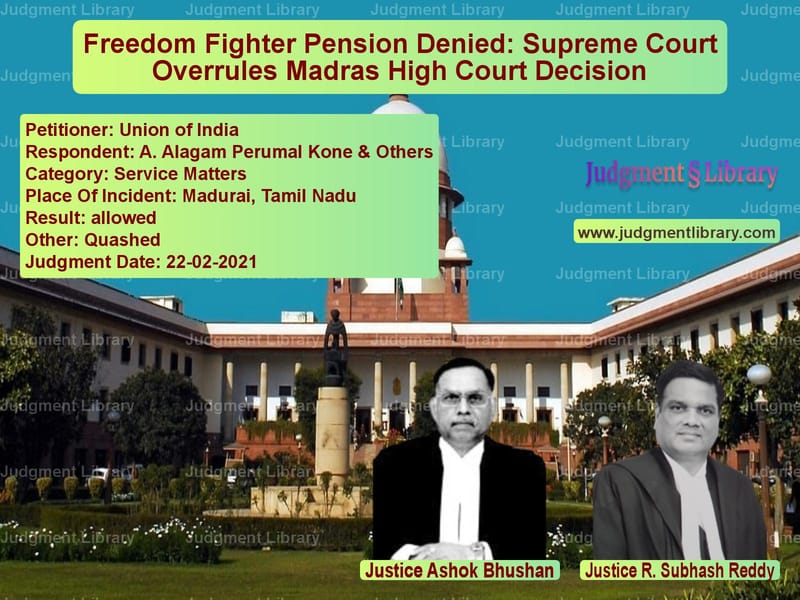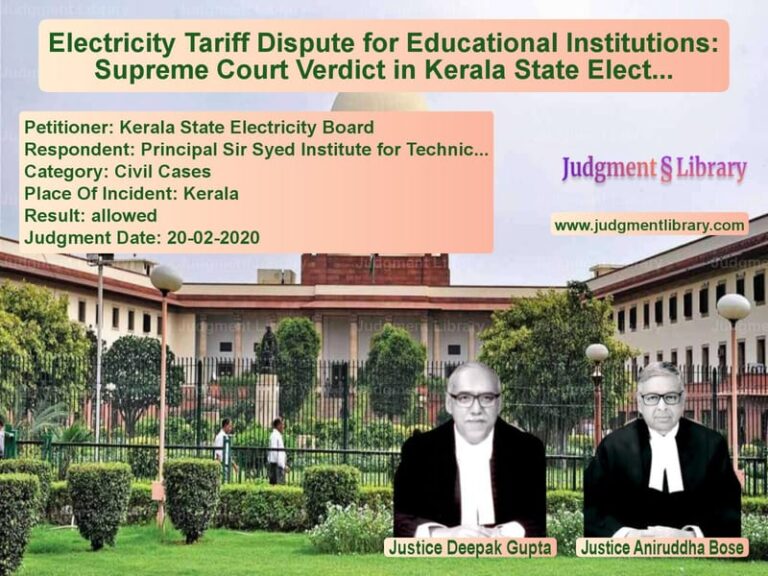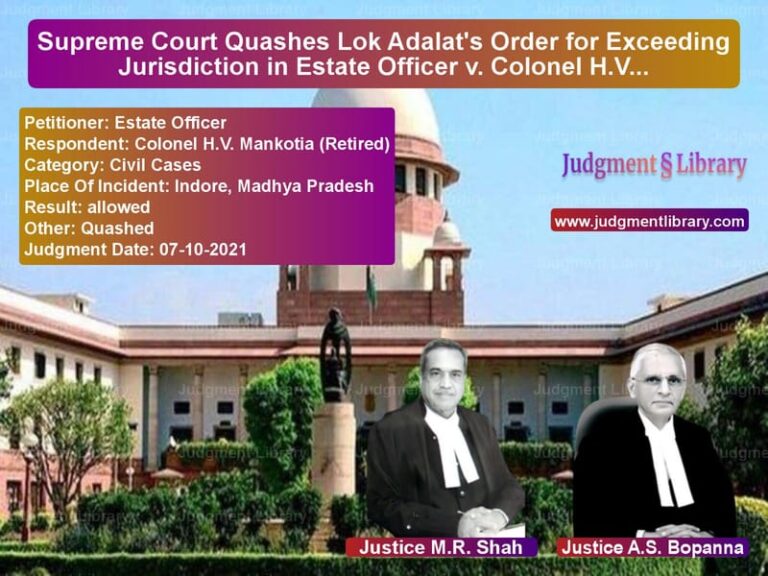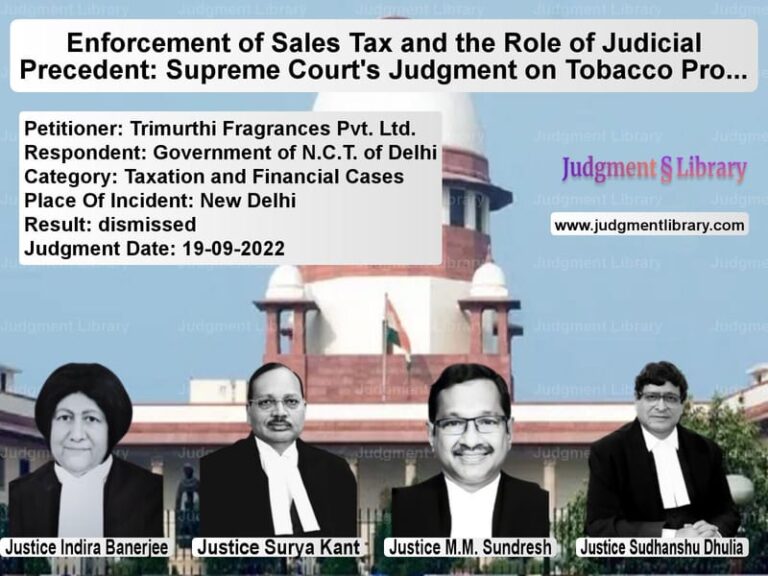Freedom Fighter Pension Denied: Supreme Court Overrules Madras High Court Decision
The Supreme Court of India recently overturned the Madras High Court’s ruling in the case of Union of India vs. A. Alagam Perumal Kone & Others, concerning the grant of pension under the Swatantrata Sainik Samman Pension Scheme. This case revolved around a freedom fighter’s claim for pension, which had previously been denied by the central government. The apex court emphasized that judicial intervention should not override eligibility conditions set by the government in specific schemes.
Background of the Case
The respondent, A. Alagam Perumal Kone, had initially applied for a pension under the Swatantrata Sainik Samman Pension Scheme in 1997, claiming that he had been imprisoned for six months during the Quit India Movement in 1944. However, the application was rejected in 2004 due to inadequate supporting documents.
After nearly 13 years, in 2017, the respondent resubmitted his claim, alleging imprisonment from January 5, 1944, to July 5, 1944. Upon inaction from the government, he approached the Madras High Court (Madurai Bench), which ruled in his favor and directed the government to grant him the pension.
Aggrieved by this decision, the Union of India appealed before the Supreme Court, arguing that the respondent had not fulfilled the eligibility criteria prescribed under the scheme.
Petitioner’s (Union of India) Arguments
The central government, represented by the Additional Solicitor General, made the following key arguments:
- The respondent’s application was initially rejected in 2004 due to the absence of a Non-Availability of Records Certificate (NARC) from the competent authority.
- The respondent waited for 13 years before reapplying for the pension, raising doubts about the authenticity of his claims.
- The High Court disposed of the writ petition without issuing notice to the government or allowing it to present a counter-affidavit.
- Freedom fighter pensions are granted based on specific eligibility criteria, and courts should not issue blanket directions without verifying the facts.
- The Madras High Court’s decision was contrary to precedents set in W.B. Freedom Fighters’ Organization vs. Union of India and Union of India vs. Bikash R. Bhowmik, where the Supreme Court upheld the government’s discretion in scrutinizing pension claims.
Respondent’s (A. Alagam Perumal Kone) Arguments
The respondent, through his counsel, countered the government’s claims with the following arguments:
- He actively participated in the Quit India Movement and had to go underground for more than a year between 1942 and 1943.
- He was later arrested and imprisoned for six months in Alipuram Central Prison.
- Other freedom fighters from his time had passed away, leaving limited means to obtain additional documentary evidence.
- The rejection of his 1997 application was arbitrary, as many others with similar cases had been granted pensions.
- The government had unjustly delayed his claim despite clear certification from another freedom fighter.
Supreme Court’s Observations
The bench, comprising Justices Ashok Bhushan and R. Subhash Reddy, scrutinized the claims and counterclaims, making several crucial observations:
- The respondent’s first application was rejected due to insufficient documentation, and he did not challenge this rejection for 13 years.
- The second application in 2017 contained inconsistencies—his initial claim mentioned going underground, whereas the later claim specifically cited imprisonment.
- The Madras High Court did not provide an opportunity for the government to file a counter-affidavit and rushed to issue an order granting pension.
- Pension under the Swatantrata Sainik Samman Pension Scheme is granted based on strict criteria, and applicants must meet all documentary requirements.
- Courts should not interfere with administrative decisions without proper scrutiny of evidence.
Quoting from previous rulings, the Supreme Court stated:
“The pension under the Swatantrata Sainik Samman Pension Scheme can be sanctioned as per the proof required under the scheme and in no other manner.”
It further emphasized:
“The High Court should not have disposed of the writ petition without issuing notice to the Union of India and allowing them to present their case.”
Final Judgment
The Supreme Court allowed the appeal filed by the Union of India and set aside the Madras High Court’s judgment. It ruled that:
- The respondent had failed to provide sufficient proof under the scheme.
- The earlier rejection of his application in 2004 was final and could not be reopened without fresh, compelling evidence.
- The High Court had overstepped its jurisdiction by issuing a direct order for pension without verifying the respondent’s eligibility.
- All future applications under the scheme must adhere to the documentary requirements, and no exceptions could be made.
Impact of the Judgment
The Supreme Court’s decision has significant implications:
- Strict Enforcement of Pension Criteria: Freedom fighter pensions will be granted only to those who meet the documentary requirements under the scheme.
- Limited Judicial Interference: Courts cannot arbitrarily order pensions without ensuring compliance with eligibility norms.
- Reaffirmation of Administrative Discretion: The ruling strengthens the government’s authority in deciding pension claims and prevents misuse of the scheme.
- Fairness in Pension Distribution: The decision ensures that only deserving individuals receive pension benefits, maintaining the scheme’s integrity.
Conclusion
The Supreme Court’s ruling in Union of India vs. A. Alagam Perumal Kone & Others reinforces the importance of procedural compliance in pension schemes. By overturning the Madras High Court’s order, the court has clarified that judicial intervention cannot override eligibility conditions laid down by the government. This verdict serves as a reminder that pension schemes must be implemented with fairness and transparency, ensuring that only genuine freedom fighters receive the benefits they deserve.
Petitioner Name: Union of India.Respondent Name: A. Alagam Perumal Kone & Others.Judgment By: Justice Ashok Bhushan, Justice R. Subhash Reddy.Place Of Incident: Madurai, Tamil Nadu.Judgment Date: 22-02-2021.
Don’t miss out on the full details! Download the complete judgment in PDF format below and gain valuable insights instantly!
Download Judgment: union-of-india-vs-a.-alagam-perumal-ko-supreme-court-of-india-judgment-dated-22-02-2021.pdf
Directly Download Judgment: Directly download this Judgment
See all petitions in Pension and Gratuity
See all petitions in Public Sector Employees
See all petitions in Employment Disputes
See all petitions in Judgment by Ashok Bhushan
See all petitions in Judgment by R. Subhash Reddy
See all petitions in allowed
See all petitions in Quashed
See all petitions in supreme court of India judgments February 2021
See all petitions in 2021 judgments
See all posts in Service Matters Category
See all allowed petitions in Service Matters Category
See all Dismissed petitions in Service Matters Category
See all partially allowed petitions in Service Matters Category







